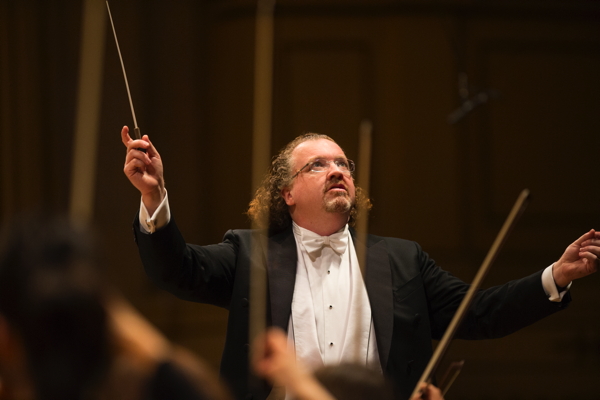
Review: An enlightening journey into darkness with Karen Gomyo and the St. Louis Symphony Orchestra
By
This weekend (October 18-20) Stéphane Denève returned to conduct the St. Louis Symphony Orchestra (SLSO) in an early 20th century program that moved from light to darkness (or at least twilight) with a lyrical pause in between.
[Find out more about the music with my symphony preview.]
 |
| Stéphane Denève Photo courtesy of the SLSO |
The concert, which I saw on Friday the 18th, opened with the bright and witty suite from Francis Poulenc's 1923 ballet "Les Biches." The title has multiple meanings in France, but Friday night it mostly translated as "vastly entertaining" as Mr. Denève conducted the orchestra in a performance that was as effervescent and intoxicating as the Champagne they're serving at the bar. It was crisp, detailed, and filled with the little nuances that Mr. Denève infallibly finds in even the lightest material. The orchestral playing was consistently excellent, including some fine solos by Principal Oboe Jelena Dirks, Associate Principal Trumpet Tom Drake, and Tzuying Huang on bass clarinet.
Up next was Prokofiev's Violin Concerto No. 1 in D major, op. 19, composed in 1917 but, because of the Russian revolution, not actually performed until 1923. It wasn't particularly well received, partly because its overall lyricism seemed tame compared to the kind of sarcastic and savage music for which the composer was known at the time.
Still, as I have noted in the past, "lyrical" is hardly a synonym for "easy." The concerto is filled with challenges both emotional and technical, including a finale that has the soloist playing a chain of trills that moves higher and higher to the very top of the instrument's range, where playing in tune becomes increasingly more difficult.
In an intermission interview Saturday night on the St. Louis Public Radio broadcast of the concert, soloist Karen Gomyo noted that the concerto is not one she has played often, but you would hardly have known that from the fierce emotional commitment and polished technique she displayed on Friday. The last time I saw Ms. Gomyo here was just this past April, when I praised her Tchaikovsky concerto as "technically pristine and warmly expressive." I frankly can't think of a better or more accurate way to describe her way with the Prokofiev.
 |
| Karen Gomyo Photo courtesy of the SLSO |
The inevitable and richly deserved standing ovation she received was followed by an encore that proved to be an ideal emotional match for the finale of the Prokofiev concerto: Astor Piazzolla's "Tango Etude No. 4." There was a time not so very long ago when the music of the Argentinian composer and bandoneon virtuoso was unlikely to show up on a concert stage, much less as an encore work. It's good to hear more of his work, especially when played with the sensitivity Ms. Gomyo brought to it.
Night descended in dramatic and powerful fashion after intermission with Rachmaninoff's 1941 "Symphonic Dances." It was the composer's last completed work (he died two years after its premiere), and there's a sense throughout of a life approaching its conclusion. Rachmaninoff had, in fact, originally titled the three sections "Noon," "Twilight," and "Midnight," but he later dropped the titles, preferring to let the music speak for itself. Which it does eloquently.
Maestro Denève brought a wider variety of expression to the work than I have sometimes heard in the past. The central section of the first movement (marked non allegro), for example, was slower and more intense than I have sometimes heard in other performances. Mr. Denève also does not shrink from using the composer's pauses to make silence a key component of the music. It can be a risky choice in an episodic piece like this one, but I thought it had tremendous emotional impact, especially in the dark and dramatic final movement.
The "Symphonic Dances" can be a real showpiece for a top-flight orchestra, and it was certainly all of that Friday night. Everyone was playing at a high level of skill and emotional commitment. The key solo moments (and there are a lot of them) were spot on. That includes (but is certainly not limited to) the contributions of Concertmaster David Halen, Cally Banham on English horn, Nathan Nabb on alto sax, Principal Harp Allegra Lilly, and Nina Ferrigno on piano. Every section of the orchestra was essentially at perfect form. Nice job, ladies and gentlemen.
It was, in short, another fine evening at the symphony, and a very appropriate one for the lengthening shadows of autumn. That said, the size of the crowd Friday night was disappointing. I understand that the early concerts in the season are usually not the most well attended, but even so the fine work being done at Powell Hall deserves a bigger turnout.
Next at Powell Hall: Expect much larger crowds this coming weekend when Norman Huynh conducts the SLSO for a showing of the film "Harry Potter and the Half-Blood Prince," with the score performed live. Performances are Friday and Saturday at 7 pm and Sunday at 2 pm, October 25-27.


